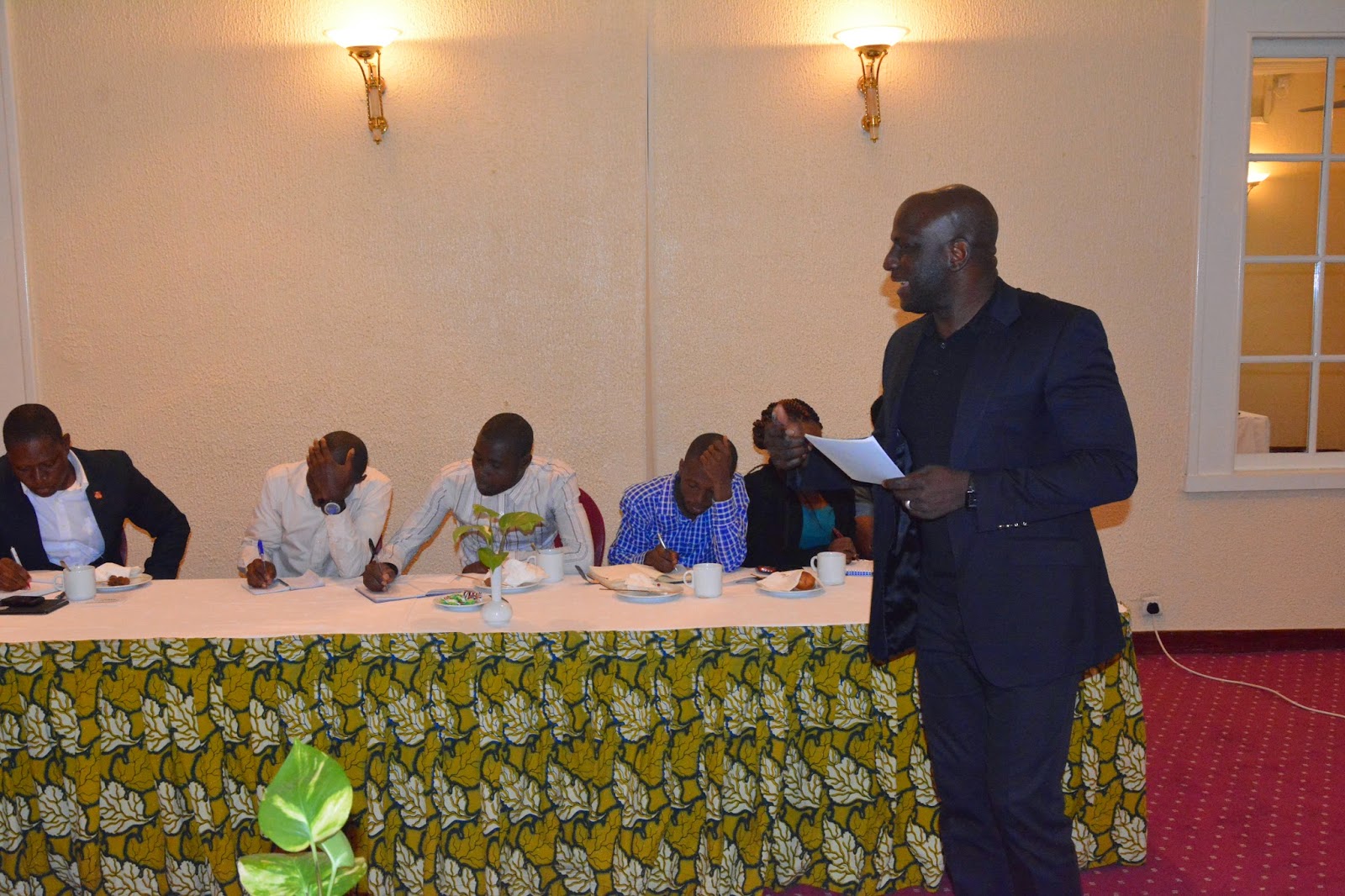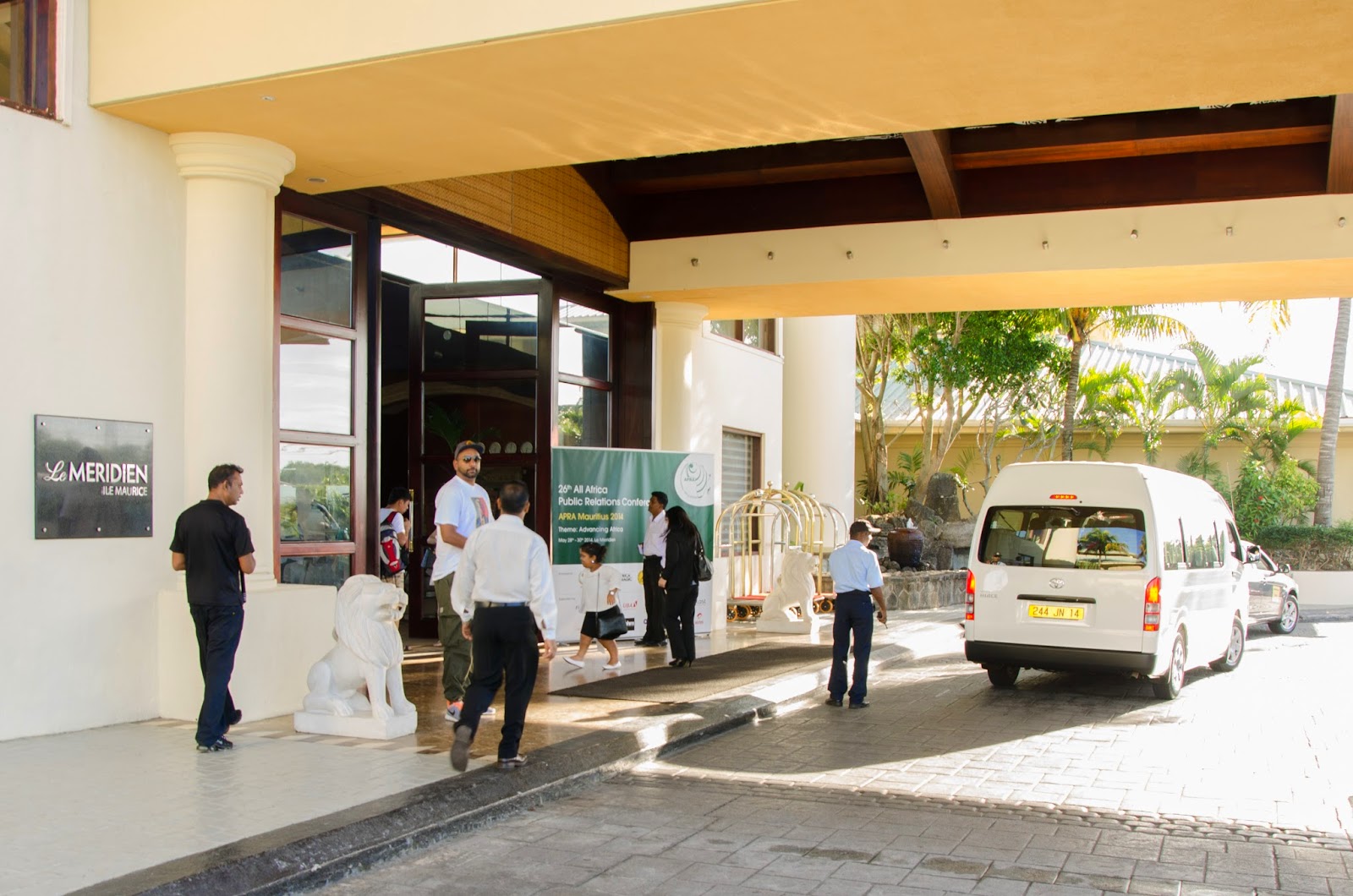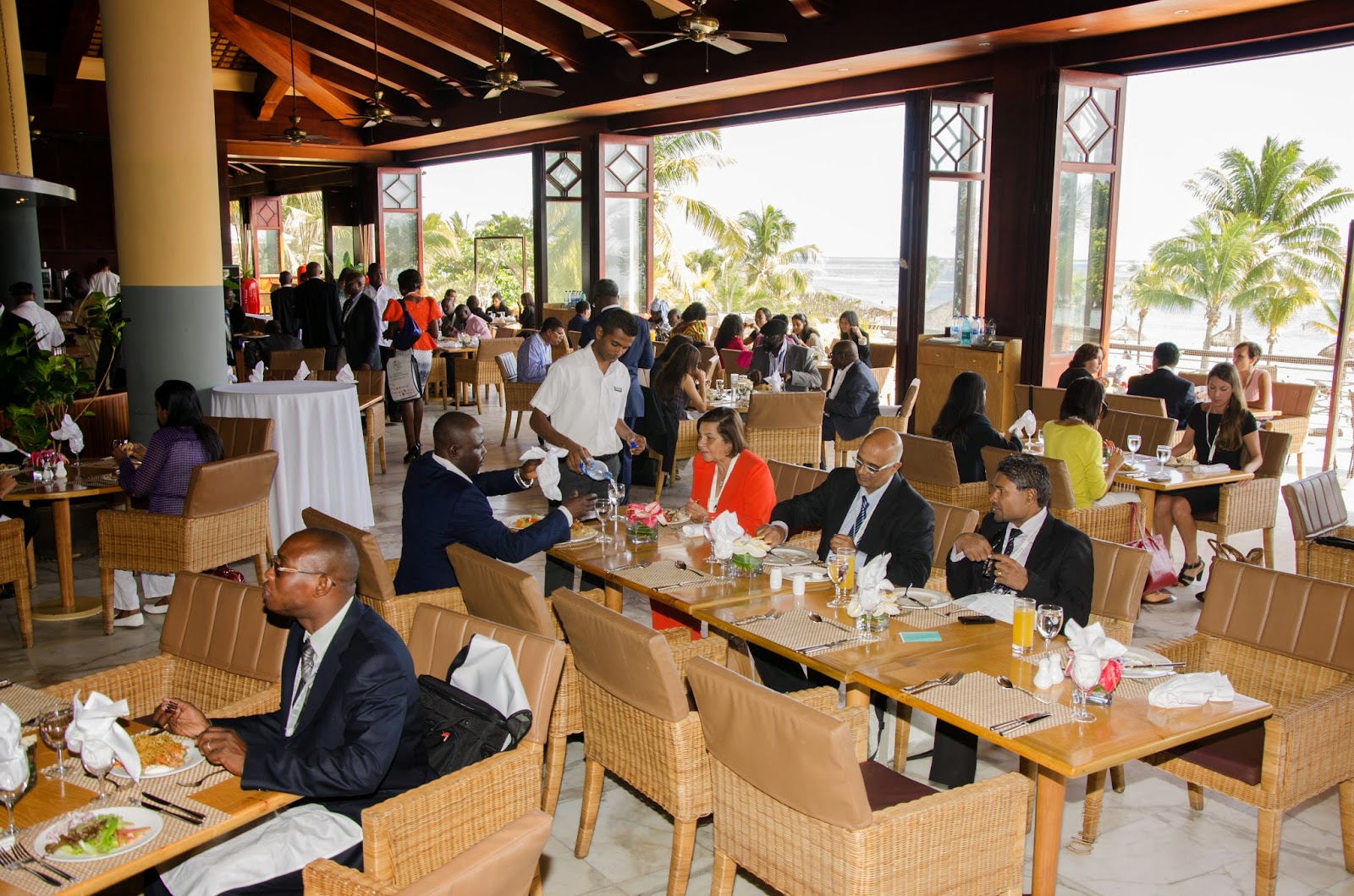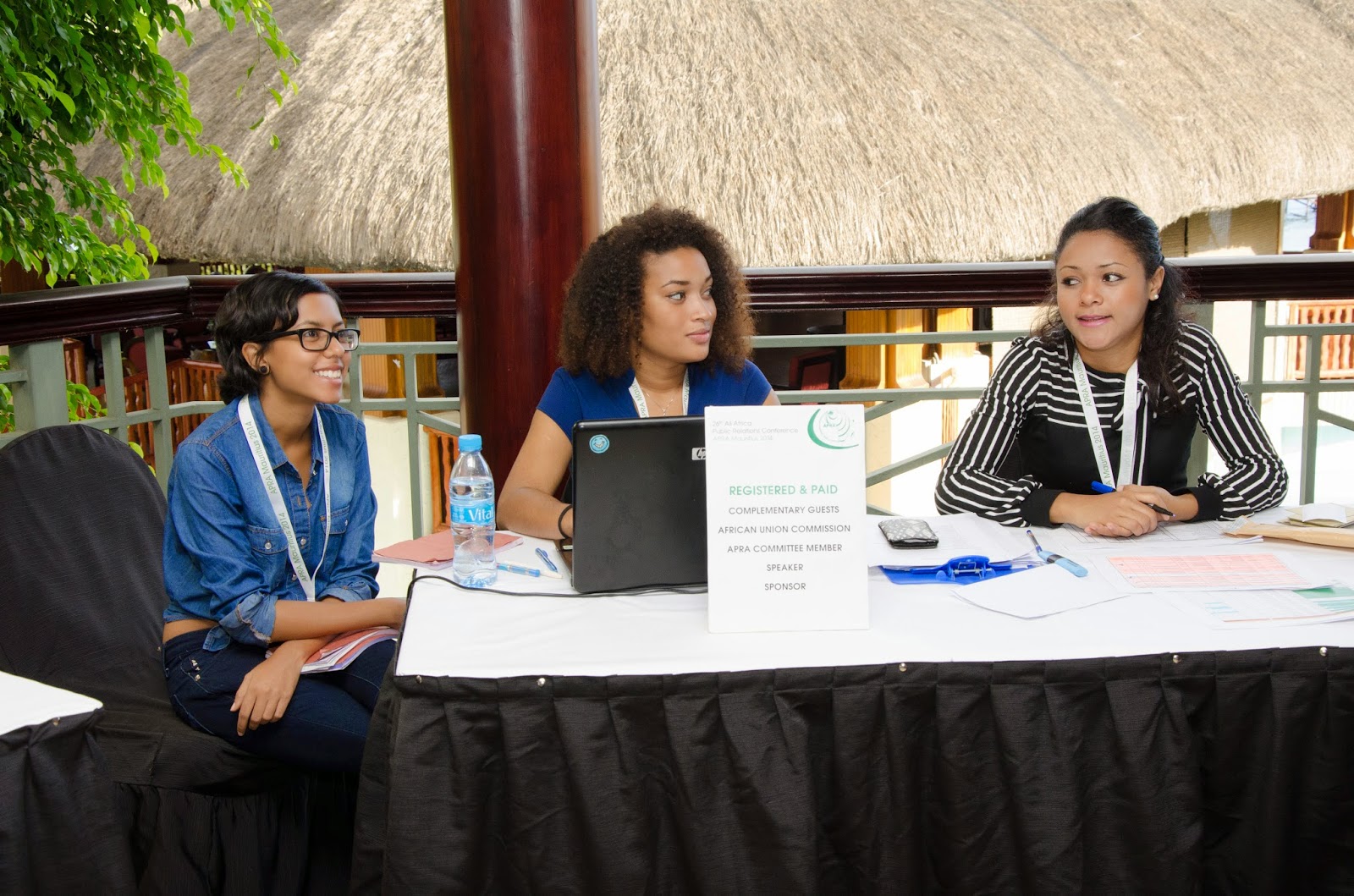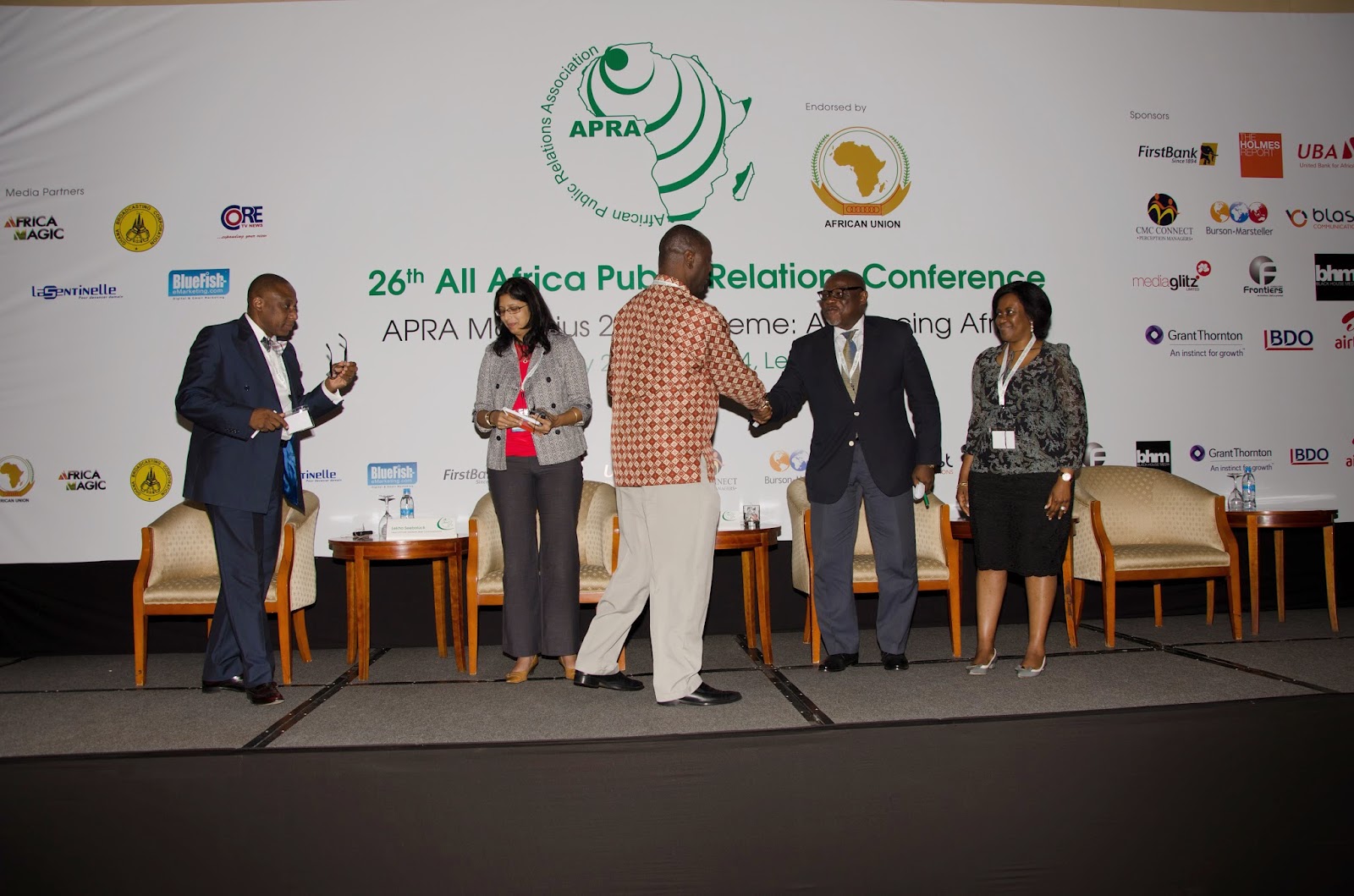Miss Wendy Tlou, Chief Marketing Officer, Brand South Africa, has said one of the keys to a successful nation branding initiative is to separate it from the government communication programme.
Monday, December 08, 2014
Saturday, November 15, 2014
Ehiguese Elected PRCAN President
Mr. John Ehiguese, Founder/CEO of Mediacraft
Associates, a leading Nigerian PR consulting firm, has been elected President
of the Public Relations Consultants Association of Nigeria (PRCAN). PRCAN is
the umbrella body of PR consultancies operating in Nigeria.
Wednesday, November 05, 2014
Why I am Running For President of PRCAN
The ‘World PR
Report’ is published annually by The Holmes Report, in collaboration with the
International Communications Consultancy Organization (ICCO). It is arguably
the most credible and comprehensive report on the global PR industry.
Tuesday, November 04, 2014
My 5 Biggest Take-Aways From The Global PR Summit 2014
By now you would probably have heard
- and rightly so - that the 2014 edition of the Global PR Summit was a huge
success. This international conference -
this year’s being the third in the series - is organized and hosted annually by
Paul Holmes, CEO and Publisher of ‘The Holmes Report’. The Holmes Report, in collaboration with the International Communications Consultancy Organization (ICCO) annually publishes 'The World PR Report' – arguably the most
comprehensive and authoritative report on PR practice globally.
Tuesday, August 05, 2014
Why Clients Should Pay PR Pitch Fees
Scenario 1: A
multinational company invites a short-list of PR agencies to pitch for its
Corporate PR business. They are made to go through the process of an EOI
(Expression of Interest) and even sign a Non Disclosure Agreement (NDA).
Wednesday, July 30, 2014
7 Things To Consider Before Starting Your Own PR Firm
So, as an experienced and successful
PR professional, you’ve just about had it being an employee, and would like to
upgrade to the enviable status of ‘Employer’ – your own boss. You think that you have all it takes to succeed as an
independent ‘PR consultant’. You have some ideas on how things can be done
better. Your mind is bubbling with so many innovations that
you would so graciously like to ‘donate’ to the PR fraternity, but cannot (or
would not) try out in your current employment. You figure it’s about time you
started working at making your own individual mark in the industry.
All of these are perfectly legitimate
enough motivations for you to want to take the plunge into setting up and
running your own PR consultancy.
As a veteran of more than a decade in
the business, I am really looking forward to welcoming you to the club. But
first, I just thought to share a short check-list of factors you might do well
to seriously consider and tick-off before you take make that move.
# 1: The Right Perspective
You need to start out with the right
perspective about your new role. As the proprietor of your own PR consultancy
firm, you will be a Professional, Entrepreneur and Businessman rolled into one. These are three ‘caps’ you will be
required to wear almost at all times.
First, you are a professional: you are expected to possess the requisite level of
professional qualifications, skills and experience. You should have met all the
laid-down requirements, statutory or otherwise, before even thinking of setting
up shop. You should also commit to a continuous search for new knowledge,
thinking and practices in the profession, so as to remain relevant.
Second, you are an entrepreneur: someone birthing a
start-up enterprise. You will do well to prepare yourself adequately for the
challenges that come with the territory. You just might find that
administrative issues like registering the business and securing the necessary
approvals, setting up the office, hiring staff and procuring the necessary
equipment and facilities will require an unexpectedly disproportionate amount
of your time and attention. Not to mention resources.
Finally, you are a businessman. One mistake common to
otherwise brilliant professionals who venture into setting up private professional
practice is that they forget (or do not realize) that the practice is also a
‘business’, and must be run as such. It must be able to pay its bills, and consistently
deliver some respectable level of financial returns to its proprietor(s).
So you see, the moment you set up a
consultancy, you immediately become more than just a PR professional. You
become several other things you probably would never have imagined.
# 2: The Requisite Skills and Competencies
As a consultant, you are supposed to
be the expert. Your clients will rely
on you for proper counsel, and to do professional justice to their briefs. You
must ensure that you are ready with the minimum requisite levels of training,
certifications, skills and experience. Otherwise you will be nothing more than
a quack, and your professional survival cannot be assured.
# 3: A Vision:
This factor is often underrated, but
arguably one of the most important. And I use ‘vision’ here in a broad sense to
include: your objectives, your goals, where you hope to be and what you hope to
do with the practice five, ten, years down the line.
The vision that you have set for
practice, and committed to pursuing, will help you craft the right strategy to
pursue your dreams, and invariably influence the choices that you make. All of
these go a long way in shaping the trajectory of the business.
# 4: The Right Attitude
It’s perfectly alright to fantasize
about how becoming the MD/CEO of your own PR firm will mean the end to all your
financial worries, and guarantee you absolute control of your time – to use as
you please.
However, in reality, it does not
necessarily work that way. It calls for an incredible amount of sacrifice,
patience and doggedness. Can you imagine having to make the difficult choice to
pay the salaries of your staff while your own children are out of school
because their school fees have not been paid? Or always being the very last
person to get paid his salary (that is if you are even smart enough to place
yourself on a salary)? Trust me, that’s not fiction. That’s entrepreneurship!
How about arriving on time for a
scheduled appointment with a prospective client, only to be forced to wait for
five hours? And then having to repeat that same routine again and again? And
ending up not getting the business anyway!
# 5: Finance/Working Capital:
True, the entry barriers for the PR
consultancy business in this environment may be very low. Your set-up costs may
not be high, but you will need a relatively cheap and reliable source of
financing for your operations, when you get into full steam. The reason is that
most clients are unlikely to pay you up-front. You might invariably find
yourself working for clients who have very punishing payment policies. I was informed
recently that one high-profile multinational company operating in Nigeria has a
payment policy of 60 working days, post-invoicing! To think that slavery was
abolished so long ago!
On the other hand, most of your
suppliers will expect to be paid immediately. This mis-match between
age-payables and age-receivables, invariably results in severe cash flow
crises, which is one of the greatest headaches that agency managers face in
this environment. To make matters worse, bank finance is not easy to come by,
and where available, is so expensive, it could erode all your gains.
Too many consultancies have been
forced to close shop, simply because they could not collect from their debtors
as fast as they were paying out to their creditors. And they had no means of
bridging the gap.
# 6: Business Acumen
As I mentioned earlier, your practice
is also a business, and so you must learn to think and act like a businessman.
Some level of financial and business management knowledge is imperative. You
must keep an eye on the numbers. And you cannot do that effectively unless you
understand and are able to interpret financial reports.
You should be able to make plans for
growing the business and managing such growth in an effective and sustainable
manner. Which means having a ‘helicopter’ view that covers every aspect of the
business – human resources, marketing, operations, finance, and so on.
True, some of these functions, can be
outsourced, but chances are that you might not be able to afford that in the
early stages of your business, and so will need to do a lot of it yourself.
# 7: Marketing/Networking Skills:
Monday, July 14, 2014
PR Measurement: 7 Compelling Reasons To Dump The AVE
The Advertising Value Equivalent (AVE) was, for a very long
time, the most widely used tool for measuring the effectiveness of PR
campaigns. However, it’s integrity was based on certain assumptions which, with
the benefit of experience, have proved to be patently flawed. The PR community
has finally come to terms with this reality, and the AVE has since ceased to be
an acceptable PR metric. Here are 7 good reasons why:
# No. 1: AVE Measures
Output, Not Outcomes
PR objectives are invariably about qualitative ‘outcomes’
(behavior and attitude change, perception, etc.), not quantitative ‘output’
like media mentions, which is what AVE measures. It does not scientifically
establish a correlation between the output recorded and the outcomes expected.
# No. 2: AVE Does Not
Take Account Of Negative Mentions
AVE works on the assumption that all the news output is
positive. But we know this is not always the case. Some people try to discount
‘negative’ AVE, but that in itself is not realistic, because that approach does
not place an accurate value on the extent of damage to reputation occasioned by
the negative report.
# No. 3: There Is No
Universal Standard For Computing ‘PR Value’
AVE is useful to the PR man to the extent that it enables him
compute the PR Value of his media output. Theoretically, PR Value is AVE
multiplied by ‘x’, where ‘x’ represents the ‘credibility’ or ‘third party
endorsement’ factor, which editorial output intrinsically enjoys. Unfortunately,
there is no universally accepted value for ‘x’ – it could range from 3 to 12 depending
on the market! Without a universally acceptable multiplier benchmark, of what
value is the AVE to PR measurement then, seeing as different people measuring
the same campaign are likely to end up with different results?
# No. 4: AVE Does Not
Measure How Much Mention
AVE does not reflect the amount or quality of mention the
brand gets within the story. Is it a headline mention, or just a passive reference
buried deep inside the report? If competition is also featured in the story,
there is no means to tell the respective scale or quality of mentions. In other
words, how much of the article is really relevant, and should ideally be
measured?
#No. 5: AVE Does Not
Reflect ‘Actual’ Advert Rates
AVE computation is based on the published gross Rate Card
rates. But we know that advertising and media buying agencies enjoy different
levels of commissions on those rates. Ideally therefore, AVE should be calculated
on the actual, net advert rate. How do you determine that universally and
across board?
#No. 6: AVE Does Not Show
Who’s Reading!
AVE at best measures what is published, not who, or how many
people, actually read the articles. This point is particularly important given
the current trend in which there is a world-wide decline in print media
readership. The ‘reach’ factor is not addressed at all. Yet it should be an
important KPI in PR campaign execution.
# No. 7: AVE Is Not
Relevant To Online/Social Media Content
It is practically impossible to attribute any form of AVE to
online or social media content. How do you, for example, assign a value to a
tweet, Facebook update or blog post? When you consider that a huge part of PR
is now done online, it stands to reason to question a metric that does not have
‘jurisdiction’ over such an important platform.
Postscript: Now that the AVE has been so
thoroughly discredited, what are the new PR measurement options available? It
is still largely Work In Progress, but ‘The Barcelona Declaration’ points the
way in a new direction.
I shall discuss its high points in the second and concluding
part of this piece.
Saturday, July 12, 2014
PRCAN Masterclass 11 Was On: "Introduction To Event Management"
The Public Relations Consultants Association of Nigeria (PRCAN) held its latest Masterclass training (the 11th in the series) on Friday, July, 2014, at The Sheraton Hotel & Towers, Ikeja, Lagos. The theme was: "Introduction To Event Management".
Mr. Chido Nwakanma, PRCAN President, opened the session with a presentation on: "Theoretical Foundation For PR & Event Management".
Mr. Otis Ojeikhoa, MD, Brand Footprint Communications, presented a paper on: "Understanding Event Planning & Management".
Ms. Moji Saka, COO, Publicis Consultants/Soulcomm, spoke on: "The Role of PR in Event Planning & Management".
Mr. Wole Olagundoye, MD, EXP Marketing, rounded up the session with: "Evaluation & Planning The Next Event".
Mr. Chido Nwakanma, PRCAN President, opened the session with a presentation on: "Theoretical Foundation For PR & Event Management".
Mr. Otis Ojeikhoa, MD, Brand Footprint Communications, presented a paper on: "Understanding Event Planning & Management".
Ms. Moji Saka, COO, Publicis Consultants/Soulcomm, spoke on: "The Role of PR in Event Planning & Management".
Mr. Wole Olagundoye, MD, EXP Marketing, rounded up the session with: "Evaluation & Planning The Next Event".
Thursday, July 10, 2014
Monday, July 07, 2014
5 Imperatives For Marketing PR Practice In Nigeria
Let’s face it,
PR practice in Nigeria is currently on trial. If in doubt, consider the frenzy
with which our governments (at all levels) as well as political parties are
falling over themselves to contract the services of foreign-based PR
consultants.
Wednesday, July 02, 2014
APRA: Mauritius 2014 – Setting An Agenda For PR In Africa
The 26th Annual Conference of the African
Public Relations Association held at the Le
Meridien Hotel in the exotic island nation of Mauritius from May 28 -31,
2014. The conference, which had as its theme: “Advancing Africa’, was well attended
by about 130 delegates from Kenya, Ghana, Gambia,
Zambia, Tanzania, Nigeria, Zimbabwe, Uganda, Mozambique, South Africa,
United States of America, United Kingdom, COMESA and the host
country, Mauritius.
Nigeria of course (you guessed it!) had the largest contingent, led by Mr. Yomi
Badejo-Okusanya who is currently the Secretary-General of APRA.
Tuesday, June 24, 2014
Once Upon a Social Media Boot Camp
As a PR practitioner, I am sensitive to how Social Media is affecting my business. It represents arguably the most significant derivative of the internet revolution (or is it disruption?), and its impact on communication has been profound. With the increasing fragmentation of media channels, changing information consumption patterns and the pervasive appeal and ubiquity of ‘mobile’, Social Media is increasingly becoming an indispensable part (or adjunct, depending on your perspective) of the PR landscape. ‘Social’ is defined by the usability factor which the recipient exercises in the way he/she processes information delivered through the internet – the ability and freedom to ‘comment’, ‘like’, ‘unlike’ and to ‘share’ (the last being the most important factor of all). It has become almost impossible today to prosecute an effective PR campaign that does not have a Social Media component.
As result, a new paradigm has evolved in this business - ‘Hybrid PR’. It is a campaign strategy driven by the synergetic deployment of traditional and Digital media channels and tools. My initial reaction to the Social Media ‘encroachment’ was at best tentative. Was it a generational thing (‘digital natives’ and ‘digital immigrants’ on my mind)? A passing fad? Or just another technology breakthrough, soon to be overtaken by yet another? That was until I started taking a closer look at the statistics: Over 60 million Nigerians with access to the internet (placing us in the league of the Top Ten countries in the world, in internet penetration); 10 million Nigerians on Facebook (and counting), 112 million active mobile lines (with 45% of them having internet access); over a million on Twitter, and so on. And then the clients started asking: What is your Social Media strategy? Where is the plan? Who are the influencers and connectors you are working with? How do we manage adverse comments, reports and crises online? Who’s handling Social Media for you? How do we measure ROI for our campaigns? At that point you realize that this goes beyond just opening a Facebook, Twitter or Youtube account. You have to get expert help. Either in-house or outsourced. But then is soon dawns on you too, as the Big Boss, that perhaps the most important expert required for the job is indeed you.
You have to yourself understand how Social Media works. For, how can you control and manage what you don’t understand? How can you be ignorant about what has turned out to be a very important and integral part of the work that you do, and yet expect to be successful? How can you lead a team whose work you do not have enough knowledge about? So, I head off to a Social Media Boot Camp in Cape Town, South Africa. It is a one-day training programme that deals with the essentials of Social Media marketing – the fundamentals, the platforms and the tools. And did I learn anything? Plenty. For starters, a Social Media campaign begins with carefully building your network, and optimizing it. Because you can’t do it all at the same time. It thrives on ‘conversations’, the most important of which is what people are saying about your brand. So you have to ‘listen’ and to ‘engage’. Because, as they say now in SM, ‘the brand is the buzz’. After you’ve built your network, you need to develop a content strategy. I learnt about the ‘1-9-90 rule’, and how influencers are important. About some of the most important SM tools, and how to use them, to target different audiences. A bit about SM integration, management and metrics. I learnt enough to kindle the hunger in me to learn more. But the most important lesson of all was the imperative to get involved.
Personally. No more leaving everything to the ‘boys’. From now on, I’ll be actively blogging, tweeting, engaging on Facebook and Google+, generating content for Youtube, Instagam, Pinterest, you name it!
I may not end up a Social Media guru, but I’ll sure do my best to become your quintessential, new-school, Hybrid PR professional.
See you in Twitterland!
Subscribe to:
Posts (Atom)










